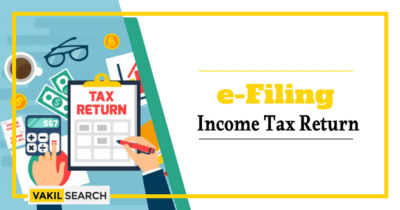When the income earned by an individual or a business is beyond the stipulated limit, taxes should be paid to the government. However, there are exceptions to this fact. Certain incomes are exempt from taxes as stated in the Income Tax Act, 1961.
Income tax is the tax imposed by the government on earnings that exceed a certain limit on various businesses and individuals within the respective jurisdictions. The government generates its revenue through these taxes. Every business or individual is liable to filing Income Tax Return (ITR) on a yearly basis to fulfill their tax obligations. But not every income earned by these entities is subjected to taxes. Section 10 of the Income Tax Act, of 1961 mentions certain types of income that are exempted from income tax.
Before filing the ITR it may be a good idea to cross-check if one’s income falls under the category of tax-free income. The following is the list of incomes that are exempted from taxes as per Section 10 of the Income Tax Act, 1961.
Unlock Financial Success With Our Unparalleled Accounting Services – Your Gateway to Streamlined Bookkeeping and Prosperity.
Incomes Exempted from Tax
Section 10 of the Income Tax Act, of 1961 states that salaried employees have the right to enjoy tax exemption in certain cases. The intention of the provision is to alleviate the burden of various taxes such as rent and travel allowances, gratuity, etc.
The following are the incomes that are subjected to an exemption under this respective section of the Income Tax Act, of 1961.
1. Agricultural Income
Those individuals that derive their income from agriculture are entitled to a tax exemption. This includes the income from farmhouses as well. To know if an income would fall under the category of agricultural income, it is necessary to look into the definition put forward by Section 2(1A) of the Income Tax Act, 1961. Agricultural income is:
- Any revenue or rent derived from land which is situated in India and is used for agricultural purposes
- Income derived from agricultural operations including processing of agricultural produce to sell in the market
- Any income from the farmhouse subject to satisfaction of certain conditions mentioned in section 80 DDB
- Income from nursery saplings or seedlings.
If your business operated by a single individual then you should file ITR for Proprietorship
2. The Income of Hindu Undivided Family (HUF)
Revenue received from family income or income from the impartible family estate or property by any member of the Hindu undivided family (HUF) is exempted from income tax return.
For instance, if ₹ 500,000 is the total income earned by a member of a HUF, the total amount is exempted from tax. Suppose, if ‘A’ is also a member of the HUF and has earned ₹ 20,000 individually, and has also received ₹30,000 from the HUF, then A is liable to pay taxes only for the amount that was earned in an individual capacity and not the amount that was received from the HUF income.
LLP ITR filing is mandatory as per the Income Tax Act, 1961, and failing to do so can result in penalties and legal consequences. Click here know about LLP income tax rates
3. Tax Exemption on Profit Share from firm/LLP
The profit share received by a partner from a firm is exempt from tax in the hands of the partner. Similarly, the profit share of a partner of LLP from the LLP will be exempt from tax in the hands of the partner. However, such exemption is limited only to the profit share and is not extended to interest on capital and remuneration received by the partner from the 80TTB
4. Income Earned by Non-Resident Indians (NRIs) by Way of Interest on Certain Bonds and Securities
Income earned by NRIs by way of interest on security bonds or through bank accounts in India can avail the tax exemption. In case of an individual’s income by way of interest on moneys standing to the credit in a Non-Resident (External) Account in any bank in India following FEMA, 1999 is exempt from income tax. However, the exemption is applicable only if a person is a resident outside India as defined under FEMA, 1999, or a person who has been permitted by the RBI to maintain the account mentioned above. This section bestows tax exemption on Indian citizens and persons of Indian origin, who are non-residents and earn income from interest on notified savings certificate.
Optimize your tax strategy – our Income Tax Calculator provides personalized solutions.
Further, any income on interest received by a non-resident or a foreign company in respect of Rupee Denomination Bonds issued outside India from 17 September 2018 to 31 March 2019 by an Indian company/ business is exempt from tax. Also, Capital gains arising out of the transfer of capital assets, rupee denomination bonds, or Derivatives by Category-III are also exempted from tax.
5. Leave Travel Concession
Section 10 (5) of the Act states that an employee, whether an Indian or foreign citizen, is eligible to avail of a tax exemption on leave travel to any place within India from the employer.
6. Remuneration Received by Diplomats and their Staff
This is a special provision for Indian representatives such as high commissioners, trade commissioners, consulate representatives, etc working in other countries wherein they can avail of a tax exemption. Employees of foreign countries can also enjoy the benefits of this provision provided Indian employees enjoy a similar exemption in their countries.
7. Technical fees Received as Income by Foreign Companies
With respect to projects pertaining to the security of India, agreements are entered by the Government of India with foreign countries. Here, the income is mostly received by way of royalties or fees for the exchange of technical services as per the agreement between the countries, and the same is exempted from taxes.
8. Allowances Paid by the Indian Government
The Indian government pays its employees various allowances and perquisites for rendering services outside India. Such remuneration is exempt from taxes. The Indian citizens who work for the government of India can avail of this exemption.
9. Voluntary Retirement Scheme
The amount received by an individual after having opted for voluntary retirement is exempt from taxes, provided the individual is an employee of a public sector or any other company, an authority under a central, state, or provincial Act, or local authority.
10. Life Insurance Policies
When an individual receives the amount after the maturation of a life insurance policy, the amount is exempted from taxes.
11. Exemption to Gratuity
Gratuity received by the central and state government servants, and local authorities are exempted from tax as per Section 10(10)(i) of the Act. The exemption is also available to non-governmental employees, if the Payment of Gratuity Act, 1972 is applicable to them. The gratuity is exempt from taxes within a maximum ceiling of 10 lakh rupees.
12. Pension Received by Employees
The monthly pension received by government employees is completely exempt from tax.
13. Leave Salary
The encashment of leave by government employees at the time of their retirement is exempt from tax.
14. Retrenchment Compensation
The compensation received by an employee at the time of retrenchment is exempt from tax to a certain limit.
15. Amount received from Provident Fund
Under Section 10(11) of the Act, any amount of money received from a public or statutory provident fund or unrecognized provident fund earns a tax exemption. Also, payment made towards the scheme Sukanya Samriddhi Yojan is also exempt from tax as stipulated under this section.
16. Awards and Scholarships
Monetary assistance received in form 26 AS of awards or scholarships is exempted from income tax returns online under Section 10 (16). There is no cap on the upper limit and the total money received as a scholarship is entitled to tax exemption.
17. House Rent Allowance (HRA)
One of the most common allowances given by the employer to the employees is the House Rent Allowance, to cover the rental expenses. The portion of the salary that is allocated as HRA is exempt from taxes.
18. Allowances under Section 10 (14)
Special allowances such as daily allowance, uniform allowance, helper allowance, etc are provided to employees during the course of their employment. Section 10(14)(i) covers these provisions and the allowances under the respective section are exempted from taxes. Section 10(14)(ii) enlists allowances that are offered to the employees that enable them to meet their day-to-day expenses. The allowances are subjected to taxes when they exceed the stipulated limit. Allowances such as children’s education allowance, tribal area allowance, border area allowance, special compensatory allowance, etc are covered under this section.
Database for ITR
Read More:










